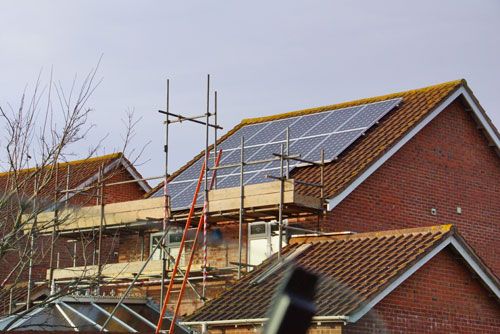

The UK government has put forward plans to significantly reduce subsidies paid to small-scale green power installations.
The Department of Energy and Climate Change (DECC) has put a proposal out for consultation to limit the amount of money paid to homeowners and businesses producing electricity from roof-top solar and small wind turbines from January 2016.
Solar and wind energy installations of less than 5MW are supported by the Feed-in Tariff (FiT), a scheme that pays producers a subsidy for the electricity they generate, plus a bonus for any electricity exported back to the national grid.
Under the new proposals, the amount to be paid from next year will fall to 1.63p per kilowatt hour from a current level of 12.92p for a new residential solar system.
The consultation says that government spending tariffs should be limited to between £75 million and £100 million from 2016 to 2018/19.
Merlin Hyman, chief executive of Regen SW, claims the announcement on August 27 puts at risk thousands of jobs.
“This will undermine the opportunity for local people, businesses and communities to take control of the way we generate, use and supply energy,” he said.
“Because of the FiT communities and businesses up and down the country have had the opportunity to harness their own natural energy resources, helping to reduce and localise energy spend, tackle fuel poverty and generate an income to re-invest in the local area. The government’s focus should be on supporting this ‘people power’ and reducing consumers’ exposure to volatile fossil fuel prices – not simply cutting costs.
“We share the government’s ambition to reduce and eliminate subsidies but these proposals put at risk the remarkable progress the renewable energy industry is making with deployment and cost reductions.”
The Solar Trade Association has been engaging with officials and ministers over the last few months demonstrating how the FiT framework could be reformed to provide much better value for money while targeting parity with fossil energy around 2020.
Mike Landy, head of policy, said: “We don’t agree with these self-defeating proposals and will be urging DECC to take up our alternative. A sudden cut combined with the threat of scheme closure is a particularly bad idea – it will create a huge boom and bust that is not only very damaging to solar businesses and jobs but does nothing to help budget constraints.
“We really are astonished at how self-defeating these proposals are. Instead, we are calling on the government to work with the solar industry to deliver our plan for a stable glide path to subsidy-free solar.”
The consultation period on the proposed changes will run until 23 October.
